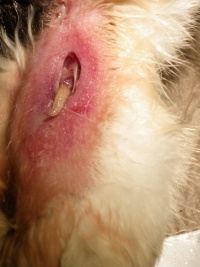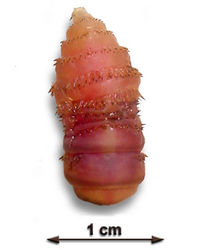Difference between revisions of "Myiasis"
m (Text replace - "Category:CABI Expert Review" to "Category:CABI Expert ReviewCategory:CABI AHPC Pages") |
|||
| (One intermediate revision by the same user not shown) | |||
| Line 1: | Line 1: | ||
| − | |||
Also Known As: '''''Fly-Strike — Wound Myiasis — Maggots — Strike — Fly Infestation — Wool Maggots''''' | Also Known As: '''''Fly-Strike — Wound Myiasis — Maggots — Strike — Fly Infestation — Wool Maggots''''' | ||
| Line 81: | Line 80: | ||
{{Learning | {{Learning | ||
|flashcards = [[Myiasis Flashcards]] | |flashcards = [[Myiasis Flashcards]] | ||
| − | |||
| − | |||
| − | |||
| − | |||
| − | |||
| − | |||
| − | |||
| − | |||
| − | |||
| − | |||
}} | }} | ||
| Line 102: | Line 91: | ||
{{review}} | {{review}} | ||
| − | |||
| − | |||
| − | |||
[[Category:Integumentary System - Parasitic Infections]] | [[Category:Integumentary System - Parasitic Infections]] | ||
[[Category:CABI Expert Review]][[Category:CABI AHPC Pages]] | [[Category:CABI Expert Review]][[Category:CABI AHPC Pages]] | ||
Revision as of 15:06, 13 April 2012
Also Known As: Fly-Strike — Wound Myiasis — Maggots — Strike — Fly Infestation — Wool Maggots
Caused By: Myiasis Producing Flies
Introduction
Myiasis is caused by infestation of live hosts with dipterous larvae. Small and large ruminants and poultry can be affected. These larvae then feed on the host’s living and dead tissue.
Myiasis Producing Flies can be obligate or facultative.
Myiasis Causing Flies
Obligate
Obligate flies occur exclusively in or on living vertebrates.
Oestrus ovis, Gasterophilus spp., Hypoderma spp., Dermatobia spp, Wohlfahrtia spp., Cochliomyia, Chrysomya bezziana and Cordylobia.
Facultative
Facultative flies are free-living and usually found in detritus or carrion.
Cochliomyia macellaria, Chrysomya megacephala, rufifacies and albiceps, Lucilla sericata and cuprina, Phormia spp., Protophormia spp. and Caliphora spp.
For more information, see Myiasis Producing Flies.
Distribution
Myiasis Producing Flies are found in most regions of the world.
Signalment
Presence of wounds, wet fleece in sheep cases, recent surgery, bacterial wool/skin contamination and faecal contamination are the main predisposing factors for myiasis.
Density of stock will determine size and viability of the fly population.
Clinical Signs
Can be classified as cutaneous, nasopharyngeal, intestinal or urogenital. Pain, irritation, discomfort, alopecia and pruritus are common signs locally. There is also likely to be direct tissue damage, haemorrhage, hyperpigmentation and secondary infection.
Nasal myiasis causes irritation and epistaxis.
Aural myiasis can cause deafness, discharge and foul exudates.
Gastrointestinal myiasis caused by Gasterophilus spp. often causes ulceration, GI bleeding, weight loss, diarrhoea and pupae are voided in faeces.
Warble flies cause cysts along the midline of the back.
Lucilia sericata tends to cause lesions on the inner thighs and perineum due to faecal soiling.
Wohlfahrtia' spp. cause genital lesions on the vulva and prepuce.
Loss of feathers and soiling of the vent is seen in poultry.
In severe cases, anaemia, anaphylaxis and toxaemia may be fatal. Likely consequence is reduced feeding and resulting weight loss and infertility.
Diagnosis
Diagnosis is primarily dependent on observation of larvae on the host or in the faeces.
Larvae may also be observed in the carcass at post-mortem.
Gastroscopy may be used in the case of gastric myiasis.
ELISA is also available for Hypoderma spp. and Oestrus ovis. PCR is available for Cochliomyia spp.
Treatment
Treatment with ectoparasiticides is usually effective. Administration can be oral, topical or by subcutaneous injection and the type of myiasis should be considered when deciding upon route of administration.
Ivermectin and doramectin are both effective in the control of nasal myiasis ,warble fly and Dermatobia when injected.
Moxidectin is the main drug for oral treatment. It is effective against Gasterophilus spp.
Topical treatment by pour-on or dipping is most effective against cutaneous/subcutaneous myiasis. A huge range of products are available. Resistance should be considered and monitored.
Control
Preventative treatment with ectoparasiticides is common.
Release of sterile insects is also possible and effective but expensive.
Vaccines are available against Hypoderma spp. and Lucilia spp.
Also see Myiasis in Rabbits
| Myiasis Learning Resources | |
|---|---|
 Test your knowledge using flashcard type questions |
Myiasis Flashcards |
References

|
This article was originally sourced from The Animal Health & Production Compendium (AHPC) published online by CABI during the OVAL Project. The datasheet was accessed on 6 June 2011. |
| This article has been peer reviewed but is awaiting expert review. If you would like to help with this, please see more information about expert reviewing. |

